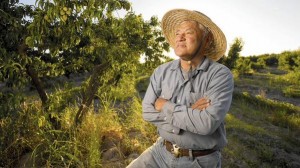By Geoffrey Mohan
David “Mas” Masumoto settles on a patio chair on a cool San Joaquin Valley evening, perhaps the last one before summer converts the valley into a kiln. The author and organic farmer has just sold the last box of his “organic, ugly, fabulous” Gold Dust peaches and Rose Diamond nectarines, varieties that ripened early and came in small in this drought year.
Two of those sobriquets attached to his fruit are hard to dispute — they were cultivated organically on his 80-acre farm south of Fresno, and they are hard to call anything but fabulous, the petite stone fruit offering back a sweetly distilled fraction of the water that went into them. That water, and its parsimonious yield, are on the mind of Masumoto, whose literary ruminations on the fate of the peach and of small-scale farming cast him as the industry’s moral agronomist.
As someone who advocates sustainable farming, what lessons do you take from the drought?
My latest thing about the whole water situation is seeing this as an opportunity. Because it’s a driver of change, like sometimes natural disasters are. You know: out of a tornado, a town rebuilds itself as green. An earthquake happens and everyone realizes they have to bring things up to a seismic safety level.
It was a gradual disaster that “suddenly” hit now — as if it suddenly hit! People are saying, we have to be conscious of this, and what can we do to be sustainable? So all these questions are starting to arise, like, where should you be farming? Where should you not be farming? Based on water.
Why is this realization that California is in a drought happening now, as opposed to last year or the year before?
It was partly when urban people suddenly realized there’s something going on. As a writer, I love it, because it’s the power of story…. You have drama, you have tension, you have the conflict. Everyone starts to say, who’s the protagonist, the antagonist. Who’s the good guy? Who’s the bad guy?… You have characters.
Who are the characters, then?
[Gov. Jerry] Brown suddenly became this main character. Of course, he’s the governor, but he’s defending ag! This is a little twist in this story line, this plot. Out of this, is there going to rise a single voice as a spokesperson, either in ag or in urban use or the environment? The environmentalists, I sense, have been very quiet in this drought…. I think they’re trying to lay low, so no one will start saying, well, wait a minute. That’s why they love the statistics of ag using 80% of the state’s water. And it’s truly only 40%. It’s 80% of the developed water. What does that mean? It means a lot of water is still used in natural sources and it’s not counted. That’s why you get these number games — it takes a gallon of water for an almond! Again, as a story, it became the metaphor. It is, in one sense, the wrong metaphor…. Suddenly you have almonds becoming this character. I thought, wow, I’m glad it wasn’t peaches!
But I think because it has now become a story, suddenly people are interested in public policy. Because there is no clear political good or bad guy yet, they’re actually talking policy more.
How has the drought changed your cultivation practices?
We’ve been experimenting with this petite peach method this year, where we’re cutting back water use 30%, 40%, 50% on some select areas of the orchard to see how it responds. Part of my thinking initially was: How much are we over-watering to chase a cosmetic quality? And it’s mainly size. Can you not grow a small, water-efficient peach that has just as intense flavor? And you can.
I realize all these years I’ve been pumping them up with fertilizer and water to try to get them artificially big. So we backed off on the water. They’re small this year, but, good god, the flavor is great. It’s fantastic. It’s probably the most intense I’ve ever had.
Will consumers buy them or will they look for the big, cosmetically perfect fruit?
We’re trying to get the markets, our buyers, to understand it, and hopefully someone to eat one and say it doesn’t matter, the size…. A lot of the buyers are saying: This is great. Good, that means their consumers are kind of getting over the size issue. We’re calling them petite peaches, because if I called them drought-tolerant peaches, or water-deprived peaches, it doesn’t sound the same…. Part of it is branding. They trust our brand. They’ll go, “Oh, this is a Masumoto peach, let’s try it.” They are not seeing the big versus small.
If you look at fresh market grapes, every year they’ve gotten bigger and bigger. Think of strawberries. Do you remember there used to be little ones? They’re huge. They’re like a little fist. Because size is just driving it all. We don’t think of that in terms of what it’s costing us. What are we paying for to get that size? And I contend that a lot is water.
So, what’s the natural use of water? If these peaches are naturally small, I don’t need to water them as much. Let me just grow them naturally. I realized, I don’t think these peaches want to be big. What’s the matter with that? That’s my breakthrough: Oh, my god, I may have been over-watering all these years. Why? Because we had access [to water]. It was cheap. It was supposedly free. And it’s not now.



